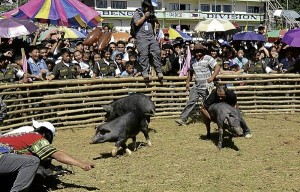MANILA, Philippines—The Department of Agriculture has said that while the prices of chicken and pork have been increasing because of “opportunistic” traders, the government is still minimizing imports of the products in order to benefit local farmers.
Jose Reaño, the agriculture undersecretary for livestock operations, said both supply and farmgate prices for chicken and pork have been relatively stable.
He said that historically, the prices of chicken and pork tend to rise when classes open and start to stabilize after a few weeks. Reaño said he did not see any other reason for the prices of pork and chicken to rise.
“Traders and retailers with opportunistic attitudes are taking advantage of the spiraling prices of other commodities,” he said.
According to DA data, during the past three weeks, farmgate prices for chicken ranged from P92 to P97 per kilogram while pork was pegged at P115 to P129 per kilogram. As of this week, the price of live pork was down by P1 in Mindanao.
In some areas, there is almost a 100 percent jump in prices from the farm to the market. “There seems to be a large profit margin in marketing,” Reaño said.
As of June 19, the price of pork belly in the markets monitored by the DA’s agribusiness and marketing assistance service (Amas) stood at P180 to P220 per kilo.
Lean meat was being sold at P180 to P200 per kilo while fully dressed chicken was being sold at P125 to P150 per kilo.
“Despite the surge in the prices of chicken and pork in our country, ours is still the lowest in the Asean, so importation is not recommended,” Reaño said.
Besides, the clampdown on importation is meant to benefit Filipino farmers, he said.
“The DA is being strict on imports so that local farmers can earn. Hog and chicken farmers are now earning,” he said.
The country’s pork importation has gone down 93.5 percent for pork belly products and 32.34 percent for pork cuts, according to the DA.
RELATED STORIES
Cold weather kills upland livestock
How big is the Philippine poultry industry?
A to upgrade facilities for livestock trade
